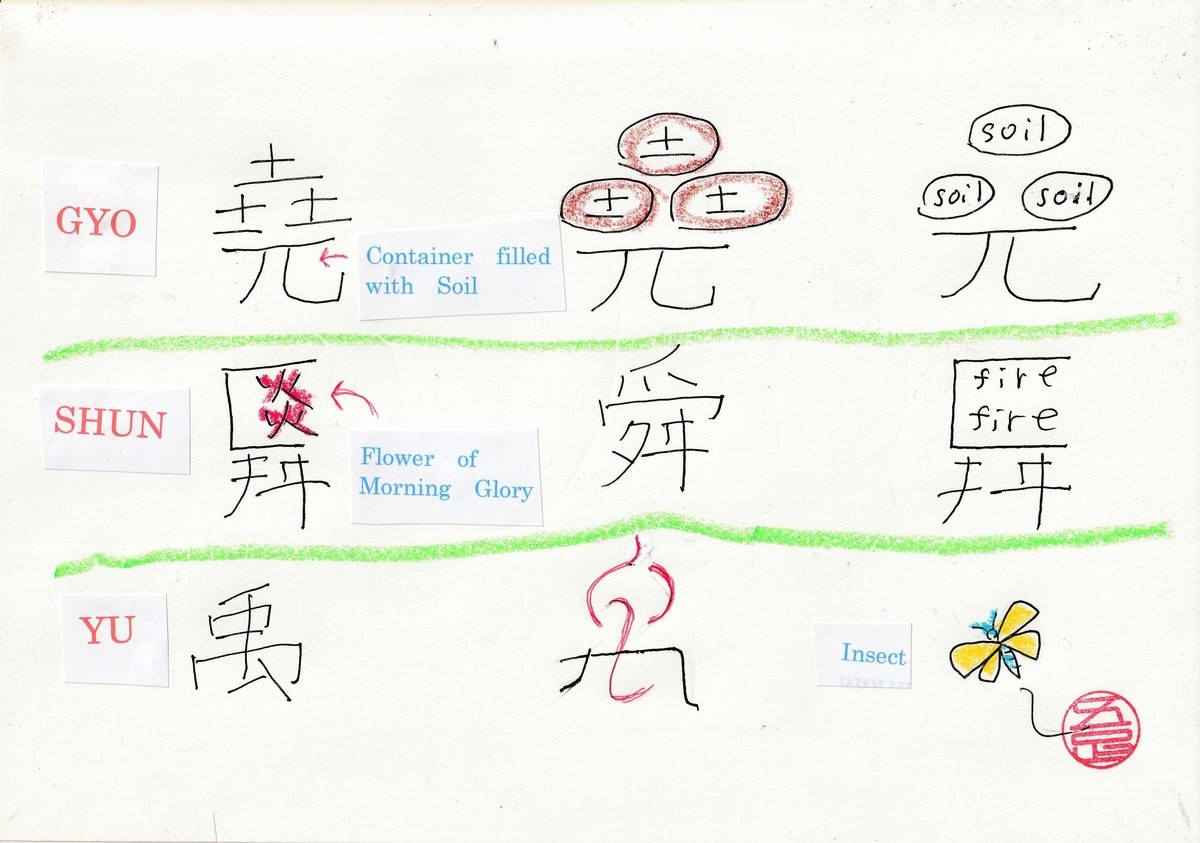Gyo, Shun, Yu : The Three Kings of Ancient China (Prose Poetry)
Gyo, Shun, Yu : The Three Kings of Ancient China (Prose Poetry)
@The three Kings of ancient China
Gyo(堯) is to fill the container with soil
Shun(舜) is the morning glory that grows there
Yu(禹) (the Great) is an insect flying to it
They act a “shanrang:禅譲”.
(note)shanrang :The virtuous king gives the throne to the virtuous one.
(↑ The above is verse poetry. Prose poetry from now on. ↓)

Gyo, Shun, Yu (堯・舜・禹)
There are various kings in ancient Chinese mythology, but three of them are listed here. (In addition, there are Fukugi (伏羲), Shennong(神農), Yellow Emperor(黄帝), etc. and it is also called the Three Kings and Five Kings:(三皇五帝).
Gyo means to pile up the soil on the container (兀). Since there is a lot of soil, three soils are lined up.
Shun is the morning glory that grows on the soil.
Yu is an insect that flies to the morning glory.
It means a series of horticultural work with 尭, 舜, and 禹. In that way, the throne was inherited "naturally". The reason why I got this knowledge is that I was unraveling Kodansha's "large dictionary" when I was in university. Certainly, if you read the dictionary carefully and expand the image, you will understand the essence hidden in the kanji. There is something very interesting about the wording of kanji, and the meaning is enormous. Well, this episode is also an important activity for agriculture and beekeeping.
In addition, " shanrang =Zenjo" means that the former king transfers the throne to the latter king without any conflict.
In the case of Gyo, Shun, and Yu, as we have just seen, the throne has been inherited without conflict. It is "Shanrang". There, Yu became the founder of the summer dynasty. (After Yu the Great, the relatives become Heir to the throne. This is something to watch out for.) On the other hand, to eliminate or kill the former king with his own strength and become the king is "cutting down:放伐". It's so called. The King of Xia(桀) in the summer dynasty and the King of Shang(紂) in the Shang dynasty are famous as the killed king.
“The book of document (書経:shokyou)” that describes their words and deeds is one of “the four books and five classics:四書五経”. In addition, I studied Shanrang in high school Chinese writing (I do not know how it is now), when Gyo walked outside, the people hit the belly, hit the ground, it’s "Kofukugekijo(鼓腹撃壌)". and they without knowing the achievements of the king, Said it is not the power of the king that make us rich. When he heard this, he was satisfied and smiled. Lao Tzu praises such a king in Chapter 17, Writes:
About the best person (Ideal monarch), his people only know that there is such a person. In the next (monarch), they praise him with a sense of intimacy. In the next (monarch), they are much afraid of him. When it comes in the next (lowest monarch), they just look down and make a fool and laugh him…
Tamaki Ogawa: Translation (Chuko paperback)
The story of King Gyo, Shun, and Yu talks about the transfer of the throne without struggle, but I think it was a "fairy tale" for China, which has mostly a change of government by force. It must have been a metaphor for gardening work in that sense.
Greeting
This blog, which I wrote for almost a year and a half, is the final episode today. At the beginning, I intended to continue for a relatively long time, but the number of readers who visited was small, and I decided to discontinue the 64 blogs of I Ching's 64 Hexagrams, and that time has come. Rather, it was written for foreigners, so it is a miscalculation that there were few visits in that sense. I am grateful to all the people who came to see my blog because of coming to see under a same star. Good luck!
Updated once a week on Wednesday or Thursday.
In Japanese, original
堯・舜・禹:古代中国の三皇帝
古代中国の三皇帝
尭は、容器に土を盛ること
舜は、そこに生える朝顔
禹は、それに飛んでくる昆虫
彼らは禅譲を行なった。
(注)禅譲:徳のある王が、やはり徳のある者に王位を譲ること。
(↑以上は韻文詩です。これから散文詩。↓)

古代中国の神話には、いろいろな王が登場しますが、ここに挙げたのも彼らのうちの3人です。(ほかに、伏羲、神農、黄帝などがいて、三皇五帝などともいわれます。)
尭(ぎょう)は、容器(兀)の上に土を盛上げることを意味します。沢山の土なので3つ土が並んでいます。
舜(しゅん)は、そこに生える朝顔です。
禹(う)は、朝顔に飛んでくる虫のこと。
尭・舜・禹で、一連の園芸作業を意味するのです。そのように、「自然なままに」王位は継承されたというわけです。この知識を、私がどのように仕入れたかと言うと、大学時代に、講談社の「大字典」を紐解いていたからです。ただ字典を念入りに読み、イメージを膨らませると、このような、漢字に隠されたエッセンスが解るのです。漢字のいわれには、非常に興味深いものがあり、その意味するところ絶大なものがあるのです。まあ、このエピソードは農業、養蜂業にとっても重要な営みですね。
なお、「禅譲(ぜんじょう)」というのは、争いもなく先王が後王に王位を譲渡することをいいますが、尭・舜・禹の場合は、今見てきたように争いもなく王位が継承されています。「禅譲」です。そこで禹は夏(か)王朝の始祖になります。(禹以降は血族が王位を継承することになりますね。これって、要注意です。)これに対して、実力で先王を排除ないし殺して王になることを「放伐(ほうばつ)」といいます。夏の桀王(けつおう)、殷の紂王(ちゅうおう)が、排除された当事者として有名です。
彼らの言行を記した書経(尚書)は、四書五経の一つです。なお、高校の漢文でやりますが(今ではどうだか解りませんが)、「鼓腹撃壌:こふくげきじょう」として、民衆が腹を叩いて、地面を打って、王の業績を知らずに「我々が豊かなのは王様の力ではない」と歌っている場面は有名ですね。これを聞いた尭は満足して、にっこり笑ったとのことです。このような君子を老子はその17章で褒め称えています。いわく:
最上の人(君子)について、その臣下たちは、そういう人があると知るだけである。その次の(君子)ならば、かれらは親近感をもってほめたたえる。その次の(君主)には、かれらは畏れてよりつかない。その次(最下等の君主)になると、軽蔑するだけだ。・・・
小川環樹:訳注(中公文庫)
堯・舜・禹のお話は、闘争に拠らない王位の移譲を語りますが、実際には武力による政権交代がほとんどだった中国にとって、「おとぎ話」であったように考えます。その意味での園芸作業の喩えだったのでしょう。
Tags, Gyo,shun, Yu horticulture Shan Rang cutting down
The story of King Gyo, Shun, and Yu talks about the transfer of the throne without struggle, but I think it was a "fairy tale" for China, which has mostly a change of government by force. It must have been a metaphor for gardening work in that sense.
挨拶
1年半近くに渡って書いてきたこのブログ、今日が最終回です。開始当初は、比較的長く続けるつもりでしたが、訪ねてこられる読者が少なく、易経の64卦の64ブログをめどとし、打ち切ることにしていましたが、その時が来たわけです。むしろ外国人対象に書いたものだったので、その線での来訪が少なかったのが誤算です。縁あって見に来てくださった方々に感謝します。グッドラック!

